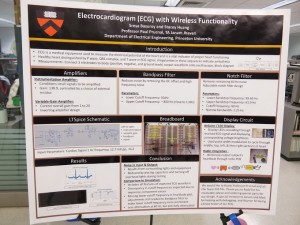
Last week, Melissa told us about her ruminations on and approaches to deciding a major. This week, I wanted to offer some of my own thoughts and reflections on why I chose to stick to the path to BSE two years ago.
To many people, engineering seems to be the hard way through college. Engineering classes notoriously lower GPAs, cause intense stress, and work you to the bone. I can’t deny I’ve had a generous share of that, as someone who’s far from the sharpest mind in electrical engineering. Sometimes it can really take a hit on my self-esteem—and it’s no lie that I’ve experienced first hand how engineering classes make you work at your limits, force you to think differently, and labor at solving problems that don’t have set answers. But that’s because the end goal is to make a coherent working system that will perform a task, which is often immensely complex, while working within physically possible limits. In other words, rather than only thinking and planning, the result is something that really works and that can interact with society in some meaningful way. And successfully creating such a system is a very satisfying feeling indeed.
The difficulty people associate with engineering often clouds that end goal.While it’s true that engineering certainly isn’t for everyone, engineering offers you a different outlook and approach to life that can benefit you far beyond the academic field. Looking back, it’s clear that engineering wasn’t only for engineers: Alfred Hitchcock studied engineering in his youth. Presidents Herbert Hoover and Jimmy Carter were also notable engineering majors. Indeed, we do need engineers in disciplines other than research and development to pull society forward. Chances are there are many more non-engineers than you might imagine who were schooled in engineering; they benefitted not only themselves but society from learning to think like an engineer. Engineering teaches you skills that can be applied to any situation you have to deal with—from its problem-solving mentality and thorough troubleshooting approach to the motivation to persevere when your pride has taken a hit. Just think about having to write a senior thesis—everything is not going to be laid out nice and clean. It takes a careful approach, planning and research to execute well—all engineering skills.

If you, like me, are thinking of graduate school, you might be considering an alternate major that might provide a higher GPA. But for graduate school, engineering doesn’t hinder your chances. It might sound obvious, but because the mean GPA for engineering disciplines is generally lower than average, you aren’t expected to get as high of a grade as people in other disciplines. People know that engineering is difficult. What’s more, graduate schools look to your research experience more than your GPA and standardized test scores. It’s what you do and your potential for conducting research that count—more so than your academic prowess.
Research in engineering is really something different—there are many more practical concerns you have to take into account that are impossible to cover and experience entirely in coursework alone. Reality is too far from perfect, and engineering must take into account all those flaws. Rather than a pure discipline that pursues science for the sake of knowledge, engineering seeks to compile existing knowledge into something that actually works. That means that the only way to really learn engineering is to experience it—whether through majoring in it and conducting independent work, or even just a hands-on course. What you can gain from even one engineering class alone can go a long way in starting to think like an engineer.
It is the solutions in engineering research that really count in the end—things like airplanes and iPhones to everyday solutions like Uber. You don’t need to have a high GPA to go to a top university to innovate and create. People all around the world, from top executives to those who don’t have university degrees, are driven by simple needs to invent, and that collective effort is what drives us forward. And isn’t that an exciting thing to be a part of?

